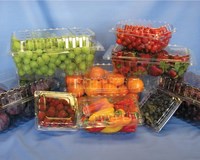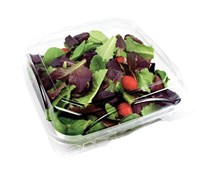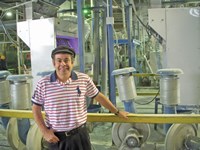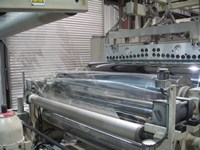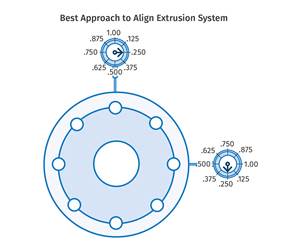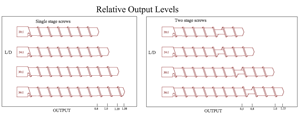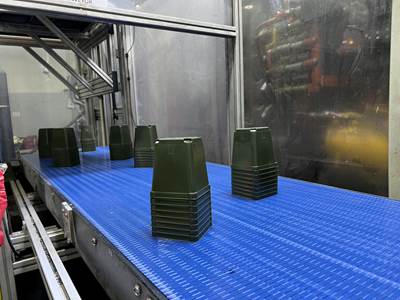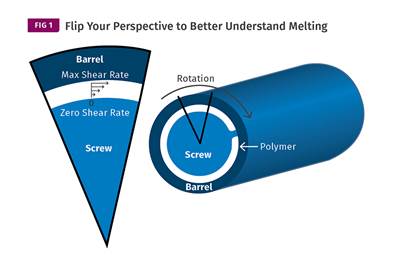Sustainability Drives Innovation at Leading RPET Processors
Two Southern California processors have boldly gone where no one has ever gone before.
Two Southern California processors have boldly gone where no one has ever gone before. Peninsula Packaging and Global P.E.T. are recent entrepreneurial ventures whose owners believe that making recycled PET (RPET) packaging is only the beginning of a good environmental footprint. And both have set up plants that are singularly appropriate for their desert environment.
Peninsula is historic for pioneering use of solar power to lower greenhouse gas emissions from energy intensive extrusion and thermoforming operations. In 2006, it installed the first major solar field west of the Mississippi next to its Exeter, Calif., plant. It’s the largest privately funded solar farm in North America. Peninsula’s solar field supplies about one-third of its overall power needs and half its power for thermoforming.
Global P.E.T., meantime, believes it’s the only processor making monolayer trays (i.e., without a cap layer of virgin PET) for direct food contact, having a letter of no-objection from the U.S. FDA. (Global P.E.T. licenses its LNO process from UltrePET LLC, Albany, N.Y., div. of wTe Corp. wte.com.)
Global is vertically integrated, grinding and washing its own PET post-consumer bottles. It also uses a low-water recycling process from Amut in Italy (amut.it), and added water treatment to reduce water use a further 20%. Global now discharges only 8 gal/min to wash 75 lb of recycled PET flake, down from 10 gal/min three years ago. The norm, even for new food-grade washing systems, is two or three times higher, though several “zero discharge” plants do exist. Sorema in Italy (sorema.it), represented in North America by Common Sense Solutions, Montclair, N.J., built a food-grade PET recycling plant in Germany three years ago that combines water treatment and reverse osmosis to recycle 100% of its process water. ECO2 Plastics in Menlo Park, Calif., has a plant in Riverbank, Calif., with a chemical cleaning process, which uses no water, but the plant is currently not in operation.
POWERING UP AT PENINSULA
Peninsula was started in Exeter, Calif., in 2002 by Ed Byrne, co-owner and general manager, with two partners to extrude and form virgin PET and RPET packaging. Installing the solar field, at a cost of $7.8 million, was “a political statement,” Byrne confesses.
But solar generates more than power and good will. It cleaned up a problem of “dirty” power in summer when temperatures in California’s Central Valley can soar above 110 F and air-conditioning demand rockets. “We have voltage sags caused by surges in demand at peak times,” explains Byrne. “Extruders are extremely sensitive to voltage dips. Before the solar installation, we had extruders shut down many times for a dip that only lasted a few seconds.”
The solar field has 3888 panels built by Schott Solar Inc., Elmsford, N.Y., which tilt to track the sun. A giant auger screw runs up the middle of the field and connects to a series of rods that move the panels every 15 sec using GPS tracking to orient them toward the sun. The panels generate 900 kw/hr in summer and 600 kw/hr in winter, or more than 2 million kwh/yr. Peninsula also maximizes natural light in the plant with skylights and high-efficiency lighting triggered by motion detectors or luminescence.
Peninsula further trims its “carbon footprint” by making packaging near where it’s used, which reduces shipping. The headquarters plant is in the middle of California’s Central Valley, where a third of the U.S.’s food supply is grown. Most of its output is used in the Valley, though its fruit trays and berry boxes find customers up and down the West Coast and in Mexico. “During the strawberry season, we’ll load 28 pallets on a curtain truck, which goes straight into the fields to be filled,” notes John Collins, Peninsula’s materials manager. A curtain truck has soft sides that roll up to unload cartons of berry boxes easily in all directions. Peninsula’s second plant, in Wilson, N.C., forms a different mix of trays and boxes for local consumption there.
Recycled content in Peninsula’s PET packaging products ranges from 75% to 95%. Just 7% to 10% of virgin PET is blended into clear monolayer sheet for berry boxes with holes punched in them. “If you try to punch exhausted recycle (with lower intrinsic viscosity), it’s brittle and you can get flags on the edges of the holes,” explains Collins. Products that don’t need holes, such as black trays and clear domes for baked goods, may contain up to 75% recycled content coextruded with cap layers of virgin PET.
Peninsula’s material handling is unusual. Thermoforming skeleton scrap is ground to 1/8-in. or smaller particles, then air-conveyed to a bin in the blending area. White and black regrind have dedicated day bins; clear goes into a silo. “Because our own regrind is heavier gauge, flat, and ground to a finer size than usual, it has higher bulk density than bottle flake, which increases throughput,” Collins notes. Incoming recycled flake (3/8-in. particles) is dried and goes into a silo.
Peninsula typically preblends about 25% of its fine regrind with RPET flake before crystallizing. After crystallizing, a small amount of virgin micro-pellets are added and blended again before drying. Video cameras are aimed at glass windows at the base of each of four dryers, so extruder operators can see at all times whether material is flowing.
Peninsula has three coextrusion lines with six unvented single-screw extruders, paired two by two. The first two lines together produce 150,000 lb/day of rollstock. They originally had vacuum pumps and vents, “but the pumps failed almost immediately—in a matter of hours—from the volatiles being drawn off the barrel,” Byrne recalls. “So we disconnected the pumps and closed the vents.” The newest and largest coex line, built by Processing Technologies International (PTi), Aurora, Ill., (ptiextruders.com) extrudes more than 100,000 lb/day.
Peninsula extrudes sheet from 12 to 40 mils thick and 56 in. wide. Takeoff equipment, designed in-house, winds 4000-lb rolls that allow the thermoformers to run up to 2 hr without a roll change. Peninsula operates 14 roll-fed thermoformers from Lyle Industries Inc., Beaverton, Mich. (lyleindustries.com), each forming close to 50,000 lb/day.
Peninsula isn’t vertically integrated back to the bottle bale. It buys clean RPET flake from Global and other recyclers. But Peninsula’s investors recently purchased a 25% interest in Peninsula Plastic Recycling Inc., a new plant in Turlock, Calif. That operation is majority owned by Merlin Plastics in Canada, which is also a long-time supplier of RPET to Peninsula.
Peninsula has grown rapidly from the days in late 2002, when it occupied one corner of its leased plant. Today it occupies 350,000 sq ft of the same plant, and 120,000 sq ft in North Carolina, and employs 275 people in all. It used to run 24/7 for 365 days a year at both plants, but this year it will stop for Christmas.
The company was awarded the Dan Eberhardt Environmental Stewardship Award from the Society of Plastics Engineer’s GPEC Conference in 2009 for overall sustainability of operation, and a Certificate of Partnership from the U.S. EPA in 2007 for its role in solar power use and reducing greenhouse gas emissions. The California Product Stewardship Council named Peninsula “Outstanding Partner of the Year” for 2008 and 2009 for accomplishments in sustainability.
VERTICALLY INTEGRATED
Global P.E.T. Inc. in Perris, Calif., was started in 1997 by Nadim Bahou to grind clean post-industrial PET bottles. Its grinding capacity today is close to 6500 lb/hr, or about 60 million lb/yr. The firm has three dedicated grinders for reclaimed PET—two for clear, one for green. A fourth grinder is located in the washing line.
In 2005, Global added washing of flake to its operation with patented friction washing technology from Amut. The flake washers are custom designed for low water use. They deploy closed-loop water filtration with diatomaceous earth filters, allowing Global to recirculate water seven times before discharge. Global also added its own water-treatment system with very large settling tanks and PP fabric filters, which further reduce the amount of water discharged. Cleaning with less water uses less caustic soda and also requires less neutralizing before discharge.
Global works with two sizes of flake because it’s more efficient to grind, wash, and sort big flakes, while small flakes are more efficient for crystallizing and extrusion. “Three-quarter-inch flakes have an easier time coming through the screens, so flake doesn’t back up or make fines,” explains Bahou. “The washing line also doesn’t have to work as hard. If you fill a washer with larger flake, it’s lighter than a machine filled with smaller flake. Polyolefin caps and labels float to the top faster, so again the washing machine doesn’t have to work as hard. Automatic sortation is also more efficient.”
After washing, rinsing, and drying, clean flake is screened and oversized flake is ground a second time down to 3/8 in., which is a more efficient size to crystallize and extrude.
In 2007, Global added two Amut single-screw extrusion lines and in late 2009 a thermoforming line from Lyle, thereby becoming vertically integrated from baled post-consumer PET bottles all the way to finished RPET food trays. Global typically extrudes 12- to 24-gauge sheet and can go up to 40 gauge.
Global calls its food packages Bottle Boxes, and claims they are the first RPET trays in the world made of 100% post-consumer content with an FDA letter of no objection for direct food contact. Bottle Boxes, which come in four sizes in clear or smokey black, are monolayer without the usual cap layer of 5% to 25% virgin PET. “Most people can’t extrude a bank of 100% RPET that can flow onto the chill rolls,” claims Bahou. Part of the solution is mounting the die perpendicular to the gap between chill rolls. The rest is due to higher I.V. Flake after washing and drying has 0.75 to 0.76 I.V., while sheet after extrusion has 0.72 I.V. “I’m going for direct food-contact quality, which is very strict—unlike clamshell boxes, which are less demanding,” Bahou explains.
Global’s RPET content is higher than most for another reason besides no cap layer. Global achieves high brightness by including a small amount (4%) of light blue RPET flake to mask yellowing, thus avoiding use of virgin masterbatch. Extruders of PET sheet, whether recycled or virgin, typically add small amounts of blue masterbatch.
Global allows blue bottles to mix with clear in the upfront color sorting of clear bottles from green. After grinding, washing, and drying, the clear flake passes through two color separators supplied by Satake USA, Stafford, Tex. (satake-usa.com). The first removes dark-blue flake, leaving light and medium blue flakes. The second removes any PVC.
Global continues to expand rapidly. A second Amut wash line starts up this month, which will add 3500 lb/hr of washing capacity dedicated to green PET flake, bringing the total wash capacity to 8000 lb/hr. Global extrudes green PET into black sheet for bakery and other food trays.
Global’s sheet extrusion is also expanding. Two extruders now produce 3000 lb/hr of rollstock. A third extruder, capable of 4000 lb/hr, is being installed this month, bringing total sheet capacity to 60 million lb/yr. The second and third thermoforming lines (from Amut) were installed late last year. A fifth grinder is on order, which will be dedicated to thermoforming web scrap.
Global runs extremely lean inventory, storing a maximum of only three days of baled bottles and only two to three days of clean flake and rollstock for its extrusion and forming operations.
Global’s extensive machine shop fabricates conveyors, refurbishes grinders, and changes AC drives. A rigid maintenance schedule effectively eliminates unscheduled downtime. The wash line, for example, has weekly maintenance that takes one 8-hr shift. “We’ve learned that if you spend time on regular maintenance, you rarely have unscheduled downtime,” says Tarek Tayara, Global’s v.p. of operations. Global now has 134 employees and operates 24/7 except for six holidays a year.
Related Content
Extruder Alignment: Important, but Only Half the Equation
The other half? Aligning and supporting downstream equipment. Here are best practices.
Read MoreWhy Compression Ratio is Important
Compression ratios have been pretty much standardized over the years, based on what has typically worked before. But there are quite a few variables that must be considered in order to get the optimum performance from your screw.
Read MoreHow Much L/D Do You Really Need?
Just like selecting the extruder size and drive combination, the L/D should be carefully evaluated.
Read MoreHow Polymer Melts in Single-Screw Extruders
Understanding how polymer melts in a single-screw extruder could help you optimize your screw design to eliminate defect-causing solid polymer fragments.
Read MoreRead Next
Processor Turns to AI to Help Keep Machines Humming
At captive processor McConkey, a new generation of artificial intelligence models, highlighted by ChatGPT, is helping it wade through the shortage of skilled labor and keep its production lines churning out good parts.
Read MoreAdvanced Recycling: Beyond Pyrolysis
Consumer-product brand owners increasingly see advanced chemical recycling as a necessary complement to mechanical recycling if they are to meet ambitious goals for a circular economy in the next decade. Dozens of technology providers are developing new technologies to overcome the limitations of existing pyrolysis methods and to commercialize various alternative approaches to chemical recycling of plastics.
Read MoreUnderstanding Melting in Single-Screw Extruders
You can better visualize the melting process by “flipping” the observation point so that the barrel appears to be turning clockwise around a stationary screw.
Read More




